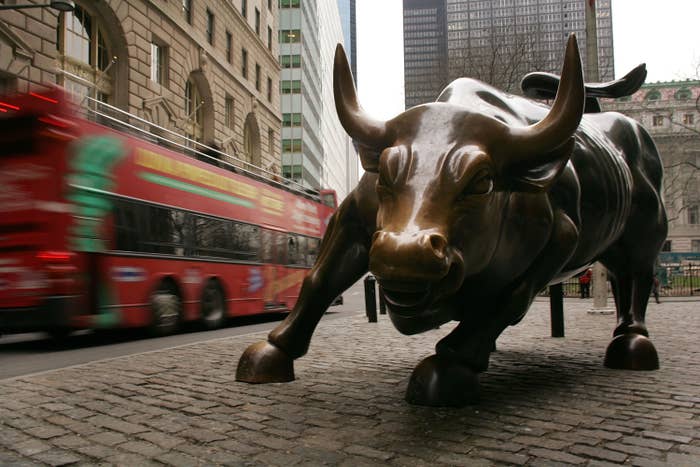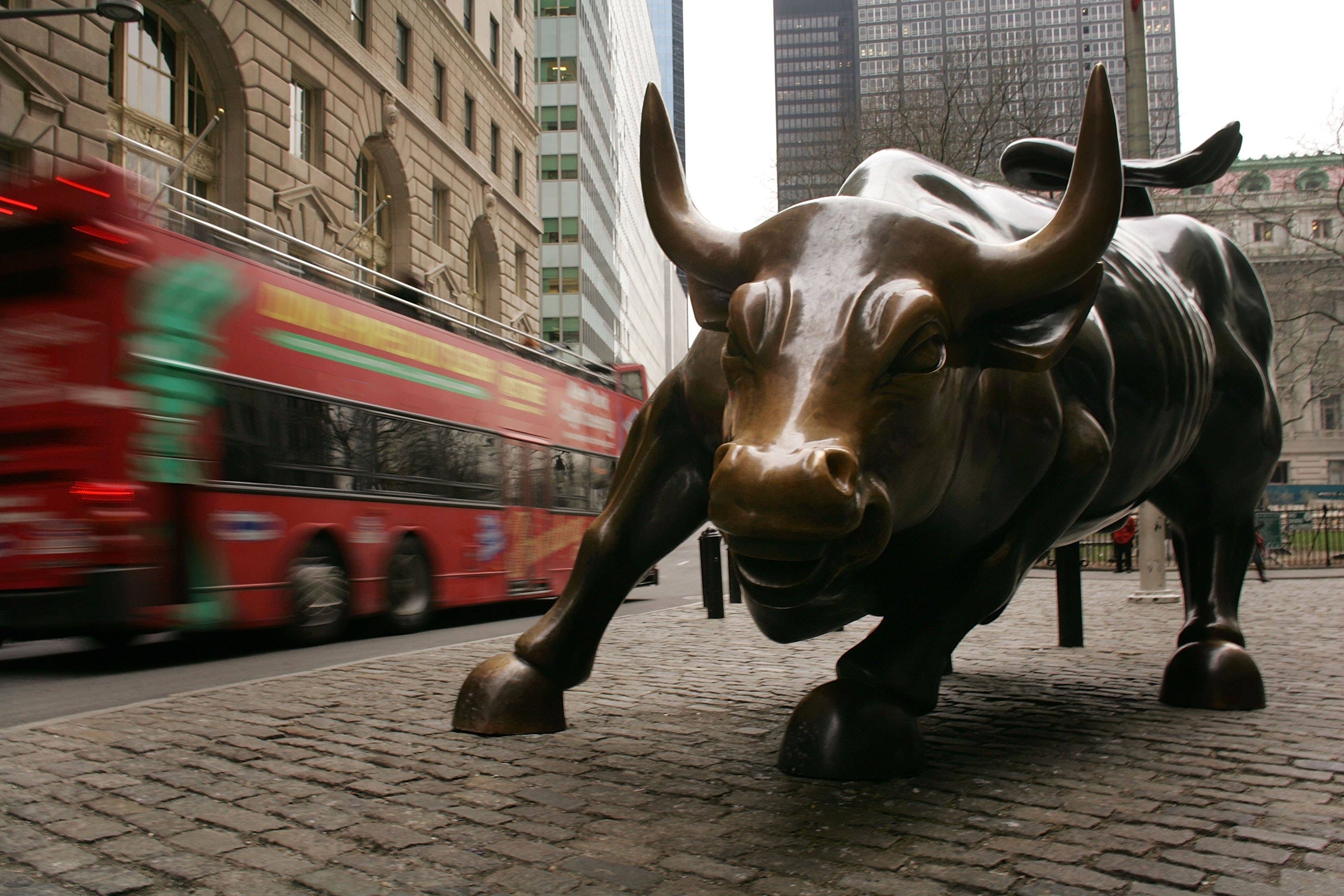
I was there on the front lines at the start of the colossal squeeze on GameStop ($GME) stock. So far, I’ve made over six figures from a $4,000 gamble, and I am addicted. I felt like I was pounding my chest along with millions of other hooligans as we watched our diamond hands bring us fortune. Memes run Wall Street now, and the retail investor can get informed through crowd-sourced due diligence—that much has been clear for the past week, as hedge funds have sought to mitigate the impact of a movement that’s still gaining momentum.
But let’s back up. What, exactly, is happening here? It goes something like this: This past month, about two million Davids waged war against a couple of Goliaths, and the smoke is starting to settle. The subreddit that started it all, /r/wallstreetbets, is full of internet trolls and wannabe day traders. Although it’s mostly a forum for gamblers to post their gains and losses, every once in a while, a gem appears. The hivemind upvotes well-researched and heavily rocket-emoji’d due diligence reports that boost confidence and make these retail traders a real force in this meme stock bubble. The most recent targets of this disorganized chatroom were hedge funds, Melvin Capital and Citron Research, that are infamous for their fair share of market manipulation.
Wsb went to work inflating the price of GameStop shares, pumping what was trading for $2 in 2019 to $345 by the end of the day on Wednesday. The move set set off a predictable wave of criticism, with, for example, Massachusetts Secretary of the Commonwealth William Galvin telling CNBC that the whole thing has “no basis in reality” and that it’s “not what you want in a capital market.” Conversation around other floundering companies—like AMC, which the same retail traders seemed primed to pump their stimulus checks into—only invited more talk about a so-called “meme stock bubble.”
As for me, well, this whole episode was an awakening. I started trading in 2016 and stopped after getting margin-called, which cost me a few thousand dollars. For the uninitiated, a margin call is a rule where your brokerage forces you to cover from losing too much on a trade. I’ve been a good boy during quarantine, so I decided to spice my life up by opening up the dusty Robinhood app and depositing around $500 into my account to play with in November.
Revisiting the /r/wallstreetbets subreddit was like coming home to a playground full of bullies and booby traps. My very first play was Palantir because it was spammed in the daily post, but also because PayPal and Facebook investor Peter Thiel was backing it. That was all the intel I needed to buy my first option, which is 100 contracts to purchase a share at a certain price. I watched this $300 investment turn into $1,700 in a few days.
These men created soldiers from internet trolls and made them brave enough to stand up to the financial establishment.
It was a fluke, right? That was pure speculation and hype from known businessmen. Maybe. I took $2,000 and started looking for my next play. The wsb daily posts highlight the best DDs (due diligence), YOLOs (going all in on a particular stock), gains, and losses. I noticed that GameStop was consistently featured in these top posts, and after reading several due diligence reports, I was convinced.
I am a beginner investor and I barely understood what they were explaining, but I will try to paraphrase it as best as I can. The brick-and-mortar game retailer has been on the decline since consoles introduced digital purchases. Short-sellers (traders who sell high and buy low) pummeled the stock to its $2 low last year. Instead of the hedge funds covering the shares and making their profit, the establishment doubled down and shorted more shares than were even available. This is where the “margin call” comes into play. If the share price rises too much for the short-sellers, they will get margin-called, and that will raise the share price even faster.
A few investors noticed these data points and realized the absolute monster this stock could be. A key player in this is Ryan Cohen, a Forbes 40 under 40 CEO who secured board seats and became the majority stakeholder in GameStop. Cohen is well known for his company Chewy, a pet-product e-commerce subscription service that sold for $3.3 billion to PetSmart. Another early whale was superstar trader Michael Burry, who predicted and cashed in on the housing market crash of 2008. (Not to mention r/wallstreetbets user DeepFuckingValue, who turned $53,000 into $48 million as of market close on Wednesday.) These men created soldiers from internet trolls and made them brave enough to stand up to Wall Street. The subreddit realized that the speculation of Cohen rebuilding GameStop into an e-commerce giant, in addition to hedge funds being forced to buy the shares they have shorted, could bring us to this historic moment.
The share price of GameStop has climbed 1,000 percent in the past month, and most of that happened in the last two weeks. Average Joes have been taking out loans to increase the price and refusing to sell until they are millionaires. Last week, hedge funds made futile efforts to shake off any weak or paper-handed individuals. Citron announced that it was going to livestream reasons why GameStop will plummet to $20 fast. The wsb hounds followed and harassed its founder, Andrew Left, and GameStop closed higher than every single call option available on the market at the time. Trading of the stock was even halted several times Friday due to irrational jumps in share price and probably the overall chaos.
That chaos continued this week, but it seems the worst is just beginning for big players like Melvin Capital and Citron Research as tech moguls Chamath Palihapitiya and Elon Musk tweet about the situation. The hedge funds that have shorted these companies have already lost over $10 billion to millennials and zoomers who want a piece of this Wall Street pie. Their attempts to stop all of it are kind of funny, since some, like Citron, have been banned from international markets because of securities fraud.
This hype shows no signs of slowing. Around 7 p.m. EST Wednesday, the wsb subreddit was temporarily put on private mode and its Discord shut down, which caused a dip in the meme stock market. After-hour share prices of GameStop dropped to a low of 190 before climbing back to 290. That may have been the first real estimate of the power of the wsb community, which has doubled to four million in the span of three days. (Now, Robinhood, TD Ameritrade, and similar apps have halted buys on call options for shorted stocks this week—so those of us who own them can only sell them. But with buys halted, who are we meant to sell them to?)
The hedge funds that have shorted these companies have already lost over $10 billion to millennials and zoomers who want a piece of this Wall Street pie.
Companies like AMC and BlackBerry are also benefiting from the support of retail investors. Most of the meme stock choices are companies with high short interest and the potential to adapt to the new landscape. BlackBerry isn’t just the business phone company from the early 2000s anymore. It has a partnership with Amazon in the autonomous vehicle technology space, and is rumored to be releasing the most secure cell phone in the world. Nokia partnered with Nasa to build the first cellular network on the moon. AMC has hit its highest price since 2017, and I’m sure everyone is itching to get out of their house. But this looks like a short squeeze that, unless AMC can adjust its strategy, will probably fail. As of Thursday morning, American Airlines is the latest company to see its share price rise from a mention on the forum.
Still, while these stocks are definitely inflated, this could be an opportunity for these companies to pivot and grow with the backing of retail investors. On the opposite side of the trade, hedge funds have been attacking the value of these companies for years. Why did brokerages let organized financial institutions borrow 64 million shares over their original shares to deflate the value of a stock? They attempted to bankrupt all these companies and weren’t acting in good faith to short to a reasonable valuation for their stock. So who really caused this inverse bubble?
There are two ways this plays out, and just like the stock market, it’s up or down. Maybe these companies will use the capital from their new valuations to innovate and shake up the business world. Cohen could turn GameStop into the next gaming Amazon, and the Microsoft partnership looks promising. Or, after the meme stock bubble pops, we fall into one of the worst recessions we have seen since the great depression. Maybe both.
Whatever happens, the establishment will keep wagging its finger at /r/wallstreetbets for gaming the system, and the windfall of money among those who believed in /r/wallstreetbets early enough will continue. I feel blessed to have hopped on this rollercoaster but hope to get off very soon. I can’t imagine trading without my comrades, but I’m thinking I can’t get used to having the due diligence done for me. For the time being, though, I’m locked in—even now, after Robinhood and TD Ameritrade this morning halted all incoming buys for stocks and options for GameStop, AMC, BlackBerry, and every other company that’s been shorted. Soon, hopefully, we launch, and I’m hungry for my tendies. Can’t stop. Won’t stop. GAMESTOP!



